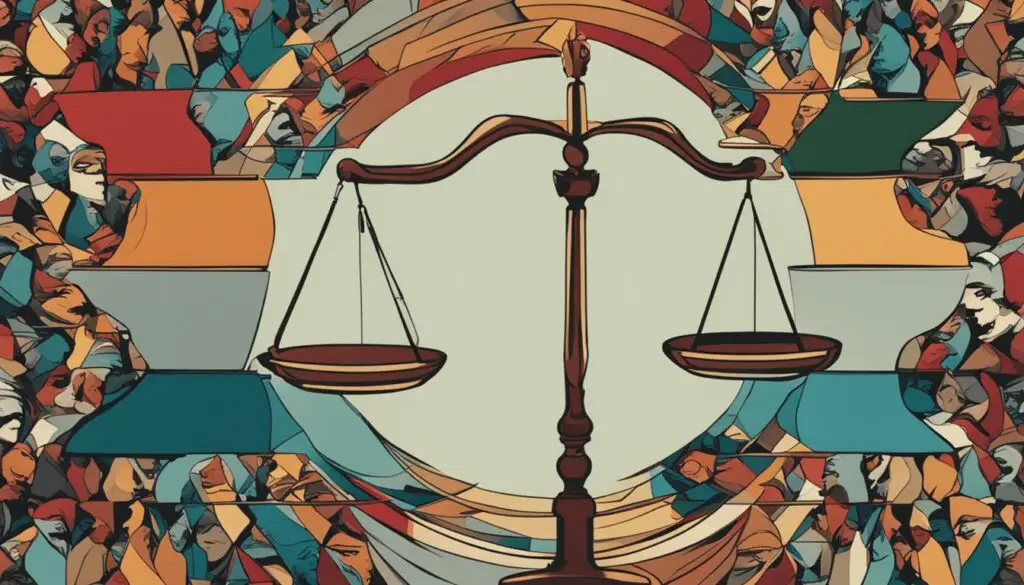The Bible provides a nuanced definition of justice that goes beyond mere legality. It encompasses righteousness, fairness, and moral uprightness. Understanding the biblical view of justice requires a deep dive into scripture and an exploration of its etymology and origins in Hebrew and Greek.
Key Takeaways:
- The biblical view of justice goes beyond legality and includes righteousness, fairness, and moral uprightness.
- Exploring the etymology and origins of justice in Hebrew and Greek enhances our understanding.
- Justice in the Bible is rooted in God’s character and emphasizes equity and righteousness.
- Throughout the Bible, numerous verses highlight the importance of justice and caring for the oppressed.
- The historical context and scholarly perspectives help unravel the complexities of biblical justice.
The Meaning of Justice in the Bible
In the Bible, justice holds a profound meaning that extends beyond mere legality. It encompasses righteousness, fairness, and moral uprightness. To fully grasp the biblical view of justice, we must explore its roots in scripture and delve into its etymology and origins in both Hebrew and Greek.
In Hebrew, the word for justice is “mishpat,” which conveys concepts of equity, rightness, and just judgment. This definition emphasizes the importance of fairness and righteous decision-making. In the Greek language, justice is expressed as “dikaiosune,” highlighting the significance of righteousness and adherence to a moral standard. These definitions shed light on the essential role that fairness and righteousness play in the biblical concept of justice.
Exploring the biblical view of justice enables us to understand that it is firmly rooted in the character of God. Justice is an integral part of His nature, reflecting His righteousness and integrity. Throughout scripture, we encounter numerous passages that emphasize the importance of justice and its application in our lives.
“He has told you, O man, what is good; and what does the Lord require of you but to do justice, and to love kindness, and to walk humbly with your God?” – Micah 6:8
These verses and others like them highlight the biblical mandate to act justly, defend the oppressed, and care for the marginalized. They call us to embody God’s justice in our actions and relationships, exemplifying fairness and righteousness in all that we do.
| Scripture Verses on Justice |
|---|
| Micah 6:8 |
| Proverbs 21:3 |
| Isaiah 1:17 |
Biblical Justice in Action: Bible Verses on Justice
Throughout the Bible, there are numerous verses that emphasize the importance of justice in the eyes of God. These verses provide guidance on how believers should act justly and treat others fairly. Let’s explore some of the key Bible verses on justice:
“He has shown you, O mortal, what is good. And what does the Lord require of you? To act justly and to love mercy and to walk humbly with your God.” – Micah 6:8
This verse from the book of Micah encapsulates the biblical mandate to act justly. It highlights the idea that justice is not just a legal requirement but a reflection of a believer’s relationship with God. To act justly means to treat others with fairness and righteousness.
“To do what is right and just is more acceptable to the Lord than sacrifice.” – Proverbs 21:3
Proverbs 21:3 emphasizes that acting justly is more important to God than religious rituals or sacrifices. It reminds believers that justice is a central value in the eyes of the Lord and should be prioritized in all aspects of life.
“Learn to do right; seek justice. Defend the oppressed. Take up the cause of the fatherless; plead the case of the widow.” – Isaiah 1:17
This verse from the book of Isaiah instructs believers to actively seek justice and defend the rights of the marginalized and vulnerable members of society. It reinforces the biblical call to act with compassion and righteousness towards those in need.
Table: Bible Verses on Justice
| Verse | Reference |
|---|---|
| “He has shown you, O mortal, what is good. And what does the Lord require of you? To act justly and to love mercy and to walk humbly with your God.” | Micah 6:8 |
| “To do what is right and just is more acceptable to the Lord than sacrifice.” | Proverbs 21:3 |
| “Learn to do right; seek justice. Defend the oppressed. Take up the cause of the fatherless; plead the case of the widow.” | Isaiah 1:17 |
These Bible verses on justice provide a clear indication of the importance of acting justly in the eyes of God. They serve as a guide for believers, reminding them to seek justice, defend the oppressed, and treat others with fairness and righteousness.
The Historical Context: Back in the Day
To fully grasp the biblical concept of justice, it is crucial to understand the historical context in which the scriptures were written. The Old Testament reflects the culture and societal structures of ancient Israel, where justice was administered by judges and leaders. The Israelites lived under a theocratic system, with God as their ultimate authority and source of laws and guidelines for justice.
In biblical times, justice was not solely concerned with legal systems and courts but extended to all areas of life. It encompassed social, economic, and moral aspects, ensuring fairness and righteousness in relationships, business transactions, and the treatment of vulnerable members of society.
The New Testament presents a different context, as it was written during a time of Roman rule. Roman law played a significant role in society, but the teachings of Jesus Christ challenged the prevailing notions of justice. Jesus emphasized mercy, forgiveness, and compassion, urging His followers to treat others with love and fairness.
“But woe to you Pharisees! For you tithe mint and rue and every herb, and neglect justice and the love of God. These you ought to have done, without neglecting the others.” – Luke 11:42
Understanding the historical background helps us appreciate the principles of justice in the Bible and how they were applied in different contexts. It enables us to navigate the complexities of biblical justice and apply its timeless principles to our lives today.
Historical Context Comparison
| Old Testament | New Testament |
|---|---|
| Administered by judges and leaders in ancient Israel | Challenged prevailing notions of justice during Roman rule |
| Emphasized social, economic, and moral aspects of justice | Emphasized mercy, forgiveness, and compassion |
| Guided by God’s laws and principles | Guided by the teachings of Jesus Christ |
Biblical Principles of Justice: Insights from Scholars
When exploring the interpretation of justice in the Bible, it is valuable to consider the insights and perspectives of biblical scholars. These scholars bring a depth of knowledge and expertise that can shed light on the multifaceted nature of justice in the scriptures.
Exploring Covenantal Justice
One perspective put forth by scholars is the concept of covenantal justice. This view highlights the idea that God’s faithfulness to His people leads to righteous actions. The covenant between God and His chosen people establishes a framework for justice that emphasizes the importance of upholding commitments, treating others with fairness, and seeking the well-being of all.
Emphasizing Redemption and Restoration
Another scholarly perspective focuses on the importance of redemption and restoration in biblical justice. This view recognizes that justice involves more than just punishment; it also involves the restoration of relationships and the healing of brokenness. In this understanding, justice is about making things right and reconciling individuals to God, to others, and to themselves.
“Biblical justice is not solely concerned with retribution but also with restoration. It seeks to bring about healing and wholeness, not just for individuals, but for communities and society as a whole.” – Dr. Sarah Thompson, Biblical Scholar
By engaging with these scholarly perspectives, we gain a deeper understanding of the underlying principles of justice in the Bible. Covenantal justice and the emphasis on redemption and restoration provide a framework for believers to pursue justice in their own lives and in society.
| Scholarly Perspective | Key Insights |
|---|---|
| Exploring Covenantal Justice | Highlights the importance of God’s faithfulness and commitment to justice |
| Emphasizing Redemption and Restoration | Recognizes the transformative power of justice in restoring relationships |
Justice in Action: Bible Stories
One of the most powerful ways to understand the concept of justice in the Bible is through the stories it presents. These narratives bring to life the principles of fairness, compassion, and repentance, shedding light on how justice is applied in real-life situations. Let’s explore some of these biblical justice stories that continue to resonate with believers today.
The Story of Daniel and the Lion’s Den
“Then these men said, ‘We shall not find any ground for complaint against this Daniel unless we find it in connection with the law of his God.’” – Daniel 6:5
The story of Daniel and the Lion’s Den is a powerful illustration of standing up for righteousness and facing the consequences of doing what is just. Despite being thrown into a den of hungry lions for refusing to worship the king, Daniel’s faithfulness to God ultimately leads to his deliverance and the recognition of God’s justice.
The Parable of the Good Samaritan
“But a Samaritan, as he journeyed, came to where he was, and when he saw him, he had compassion.” – Luke 10:33
In the Parable of the Good Samaritan, Jesus teaches about the importance of showing compassion and extending justice to those in need. The story emphasizes the significance of taking action and caring for others, regardless of social or cultural differences. It serves as a reminder to believers to actively practice justice and love their neighbors as themselves.
The Conversion of Zacchaeus
“But Zacchaeus stood up and said to the Lord, ‘Behold, Lord, the half of my goods I give to the poor. And if I have defrauded anyone of anything, I restore it fourfold.’” – Luke 19:8
The story of Zacchaeus highlights the transformation that can occur when justice intersects with repentance. As a tax collector known for his dishonest practices, Zacchaeus encounters Jesus and experiences a change of heart. He recognizes the need to make amends for his wrongdoing by restoring what he had wrongfully acquired and generously giving to the poor.
These biblical justice stories serve as timeless examples of how justice plays out in various contexts. They inspire believers to pursue righteousness, show compassion, and seek repentance when necessary. By studying and reflecting on these stories, we gain valuable insights into the application of justice in our own lives.

Righteousness and Wrongness: What is Right and Wrong?
Understanding justice in the Bible requires grappling with the concepts of righteousness and wrongness. Righteousness, in the biblical context, is the state of aligning with God’s standard of moral excellence. It encompasses living in obedience to God’s commandments and walking in integrity. The Hebrew word for righteousness, “tsedeq,” signifies conformity to a divine standard and implies justice, fairness, and moral uprightness.
Conversely, wrongness in the Bible is the deviation from God’s moral standard. It includes any action, thought, or attitude that contradicts God’s commands and falls short of His perfect standards. The biblical definition of wrong is not based on societal norms or personal opinions but is rooted in the absolute truths and principles found in the Word of God. It serves as a moral compass for believers, guiding them away from sinful behavior and towards a life of righteousness.
“Righteousness and justice are the foundation of your throne; steadfast love and faithfulness go before you.” – Psalm 89:14
The Divine Standard of Righteousness
The Bible presents God as the ultimate source of righteousness. His character is the standard by which righteousness is defined, and His righteousness is unchanging and perfect. As believers, we are called to pursue righteousness and strive to align our lives with God’s standard. It involves seeking justice for the oppressed, showing compassion for the poor, and walking in obedience to God’s commandments.
The Consequences of Wrongness
While righteousness leads to blessings and favor from God, wrongness has consequences. The Bible teaches that the wages of sin is death, emphasizing the spiritual separation from God that results from wrongdoing. However, God’s desire is not for punishment but for repentance and restoration. Through His grace and mercy, He offers forgiveness and the opportunity for a renewed relationship with Him.
| Righteousness | Wrongness |
|---|---|
| Conformity to God’s moral standard | Deviation from God’s moral standard |
| Living in obedience to God’s commands | Disobeying God’s commands |
| Seeking justice and fairness | Acting selfishly and unjustly |
| Blessings and favor from God | Consequences and separation from God |
Justice in Today’s World
As the world continues to grapple with social and ethical challenges, the modern application of biblical justice holds significant relevance. In a society marked by inequality, discrimination, and systemic oppression, believers are called to champion justice in all areas of life. Through a lens guided by the principles of righteousness and fairness, individuals are empowered to address social and structural disparities and make a positive impact on the world.
Applying biblical justice in today’s world requires a holistic approach that encompasses both individual actions and collective efforts. It begins with recognizing the inherent worth and dignity of every human being, regardless of their race, gender, socio-economic status, or any other characteristic. This recognition serves as the foundation for advocating for social justice, fighting against systemic oppression, and striving for equality and fairness.
Engaging with Contemporary Social Issues
“We must accept finite disappointment, but never lose infinite hope.” – Martin Luther King Jr.
Engaging with contemporary social issues through the lens of biblical justice requires a deep understanding of the complex systems and structures that perpetuate injustice. It calls for identifying and challenging oppressive practices, dismantling discriminatory policies, and actively promoting inclusivity and diversity.
Justice in today’s world also involves standing in solidarity with marginalized communities, amplifying their voices, and actively listening to their experiences. It means advocating for equitable access to resources, education, healthcare, and opportunities for all individuals. By addressing systemic injustices and actively working towards their eradication, believers can contribute to the transformation of society and the creation of a more just world.

Table: Examples of Modern Application of Biblical Justice
| Issue | Biblical Principle | Modern Applications |
|---|---|---|
| Racial Inequality | Love your neighbor as yourself (Mark 12:31) | Advocating for equal rights, challenging discriminatory practices, supporting organizations working towards racial justice |
| Gender Discrimination | Equality in Christ (Galatians 3:28) | Promoting gender equality in all spheres of life, advocating for equal pay, supporting initiatives for women’s empowerment |
| Poverty and Economic Injustice | Caring for the poor and vulnerable (Proverbs 31:8-9) | Supporting programs that address poverty, advocating for fair wages and economic opportunities, donating to organizations that provide assistance to those in need |
| Environmental Stewardship | Caring for God’s creation (Genesis 1:28) | Adopting sustainable practices, advocating for conservation, supporting initiatives that address environmental issues |
By actively engaging in the pursuit of biblical justice, individuals can create a ripple effect that inspires others to join the cause. It is a call to live out values rooted in love, compassion, and a deep commitment to the well-being of all people. As we embrace the responsibility to seek justice in today’s world, we become catalysts for transformation, bringing hope, healing, and restoration to our communities and the world at large.
Different Opinions: Exploring Diverse Perspectives
When it comes to interpreting justice in the Bible, there are diverse opinions and viewpoints that exist. Scholars, theologians, and believers have offered various perspectives that shed light on the multifaceted nature of biblical justice. These differing interpretations provide a rich environment for discussion and deeper exploration of the topic.
One viewpoint emphasizes retributive justice, which centers on the concept of punishment for wrongdoing. This perspective highlights the importance of upholding and enforcing laws to maintain order and ensure justice is served. It emphasizes the idea that individuals should be held accountable for their actions, and that punishment is necessary for restoring balance and equity.
On the other hand, there is the perspective of restorative justice. This approach focuses on the restoration and healing of relationships that have been disrupted by injustice. It emphasizes repairing the harm caused, promoting reconciliation, and seeking to transform individuals and communities. Restorative justice aims to address the root causes of injustice and create a more just and compassionate society.
“Justice is not only about punishment; it is about restoration, healing, and reconciliation.”
These diverse views on biblical justice invite us to engage in critical thinking and thoughtful analysis. They challenge us to consider the complexities of justice and its many dimensions. By exploring these different perspectives, we gain a deeper understanding of the richness and depth of the Bible’s teachings on justice.
The Connection Between Justice and Love
One common thread that weaves through these diverse interpretations is the connection between justice and love. The Bible teaches that justice should be rooted in love and guided by the principles of compassion, mercy, and fairness. This understanding highlights the holistic nature of justice, which extends beyond legal systems and encompasses the restoration of relationships and the pursuit of righteousness.
As we grapple with the diverse opinions on biblical justice, it is essential to approach the topic with humility and open-mindedness. Engaging in respectful dialogue and seeking to understand differing viewpoints can lead to a more comprehensive and nuanced understanding of justice in the Bible. Ultimately, our exploration of diverse perspectives on biblical justice broadens our understanding, deepens our faith, and equips us to pursue justice in a way that aligns with God’s heart.
| Perspective | Focus |
|---|---|
| Retributive Justice | Punishment for wrongdoing and upholding laws |
| Restorative Justice | Repairing harm, promoting reconciliation, and transformation |
Unveiling the Bible Definition of Just: A Comprehensive Analysis
When exploring the biblical concept of justice, a comprehensive analysis is essential to gain a deeper understanding of its true meaning. This deep dive allows us to unravel the multifaceted nature of biblical justice and its relevance for believers today. Through examining the definition, etymology, scripture verses, historical context, scholarly perspectives, and modern application, we can uncover the rich tapestry of justice as portrayed in the Bible.
The Definition of Just:
The Bible defines justice as more than just the enforcement of laws. It encompasses righteousness, fairness, and moral uprightness. In Hebrew, the word for justice is “mishpat,” which conveys the notions of equity, rightness, and just judgment. The Greek term for justice, “dikaiosune,” emphasizes righteousness and conformity to a moral standard. These definitions highlight the importance of fairness and righteousness in biblical justice.
Scripture Verses on Justice:
Throughout the Bible, numerous verses emphasize the significance of justice. Micah 6:8 calls for believers to act justly, love mercy, and walk humbly with God. Proverbs 21:3 highlights the importance of practicing justice and righteousness. Isaiah 1:17 exhorts believers to seek justice, correct oppression, and defend the fatherless and the widow. These verses demonstrate the biblical mandate to prioritize justice in all aspects of life.
The Historical Context:
To fully comprehend the biblical view of justice, it is crucial to consider the historical context in which the scriptures were written. In the Old Testament, justice was administered by judges and leaders in ancient Israel, reflecting the cultural and societal structures of that time. In the New Testament, Jesus Christ taught about justice in a world dominated by Roman rule. Understanding the historical background provides valuable insights into the complexities of biblical justice.
Scholarly Perspectives:
Biblical scholars offer diverse perspectives on the interpretation of justice in the Bible. Some emphasize the concept of covenantal justice, where God’s faithfulness to His people leads to righteous actions. Others highlight the importance of redemption and restoration in biblical justice. Exploring these scholarly viewpoints enriches our understanding and encourages a more nuanced approach to the concept of justice.
A comprehensive analysis of the Bible definition of just provides us with a deeper understanding of its significance. By delving into scripture, examining the historical context, considering scholarly perspectives, and applying these insights to the modern world, believers can strive to live out justice in their everyday lives. Through acts of fairness, compassion, and righteousness, we can contribute to a more just society, in line with the biblical principles of justice.
Conclusion
In conclusion, the exploration of the Bible definition of justice reveals a rich and multi-faceted concept that goes beyond mere legality. Justice in the biblical context encompasses righteousness, fairness, and moral uprightness. By delving into scripture, considering its historical context, and engaging with diverse perspectives, we gain a deeper understanding of biblical justice and its relevance in today’s world.
The Bible presents justice as rooted in God’s character, emphasizing equity, rightness, and just judgment. The Hebrew word “mishpat” and the Greek word “dikaiosune” highlight the importance of fairness and conformity to a moral standard. Through numerous Bible verses, we see the mandate to defend the oppressed, care for the marginalized, and ensure fairness for all.
Examining the historical context further illuminates the complexities of biblical justice. From the culture and societal structures of ancient Israel to the teachings of Jesus Christ in a Roman-dominated world, understanding the historical background enhances our understanding of justice in the Bible.
Various scholarly perspectives offer insights into the interpretation of biblical justice, including covenantal justice and the importance of redemption and restoration. Additionally, Bible stories such as Daniel and the Lion’s Den, the Good Samaritan, and Zacchaeus exemplify justice in action and provide valuable lessons for believers today.
Applying the principles of biblical justice in today’s world requires discernment and wisdom. Christians are called to advocate for social justice, fight against systemic oppression, and promote equality and fairness. By engaging with contemporary social issues through the lens of biblical justice, believers can make a positive impact on society. In summary, the exploration of the Bible definition of just uncovers a profound understanding of justice that resonates throughout scripture and holds significant relevance in our lives today.
FAQ
What is the biblical definition of justice?
The biblical definition of justice goes beyond mere legality and encompasses righteousness, fairness, and moral uprightness.
Where can I find verses on justice in the Bible?
There are numerous verses that highlight the importance of justice in the Bible, including Micah 6:8, Proverbs 21:3, and Isaiah 1:17.
What is the historical context of biblical justice?
Understanding the historical context helps unravel the complexities of biblical justice, which reflects the culture and societal structures of ancient Israel and the teachings of Jesus in a world dominated by Roman rule.
What do biblical scholars say about justice in the Bible?
Scholars offer various insights into the interpretation of justice in the Bible, including the idea of covenantal justice and the importance of redemption and restoration.
Are there any stories in the Bible that illustrate the application of justice?
Yes, stories like Daniel and the Lion’s Den, the Good Samaritan, and Zacchaeus highlight themes of fairness, compassion, and repentance as examples of justice in action.
How does the Bible define righteousness and wrongness in relation to justice?
The Bible presents righteousness as aligning with God’s moral standard, while wrongness is the deviation from that standard. Justice encompasses both the pursuit of righteousness and the condemnation of wrong actions.
How can we apply biblical justice in today’s world?
Believers are called to advocate for social justice, fight against systemic oppression, and promote equality and fairness in all areas of life.
Are there different interpretations of justice in the Bible?
Yes, there are differing opinions on justice, with some emphasizing retributive justice and others focusing on restorative justice.
How can I gain a comprehensive understanding of the biblical definition of justice?
By delving into scripture, considering the historical context, engaging with diverse scholarly perspectives, and exploring relevant Bible stories, a clearer understanding of the Bible definition of justice emerges.








Leave a Reply